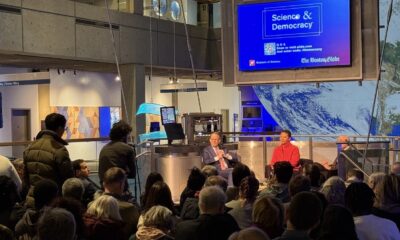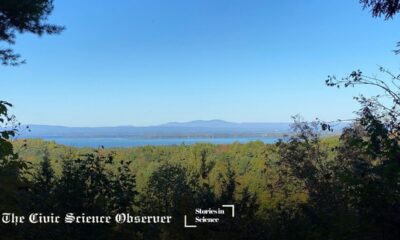Stories in Science Special Series
When your greatest weakness becomes your greatest strength
I have a language disability and a fine motor skill deficit. As a child, I would try not to speak up in class or speak too loudly because I was afraid I would misspeak. I knew what I wanted to say in my head, but it didn’t come out the same way.

– Amie Norton, Ph.D. –
[dropcap]W[/dropcap]hat does Albert Eienstein, Leornado da Vinci, Micheal Faraday, and Archer Martin all have in common? They all had dyslexia. Not every disability is visible. I have a language disability and a fine motor skill deficit. As a child, I would try not to speak up in class or speak too loudly because I was afraid I would misspeak. I knew what I wanted to say in my head, but it didn’t come out the same way. I was teased for my speech and became withdrawn around my peers. I attended speech therapy and improved, but I still have to practice and memorize what I say months before I speak in public.
My fine motor skill deficit is something that I have tried to compensate for my entire life. Things that other kids learned to do, like tying shoe laces, was very difficult for me. My handwriting is very big and it’s painful if I have to write for long periods of time. Occupational therapists told my parents that I would always have to compensate to be able to do everyday things such as opening medicine bottles or get lids off of jars. I have learned to do this with great success and people don’t identify me as having this disability until they get to know me. My handwriting was always a bone of contention with some teachers even though they knew I have this disability. People think you can just practice more and your handwriting will magically improve. It doesn’t really work like that.
I am not defined by my disabilities, but I am shaped by them. I have learned to never give up when things are tough.

Dr. Amie Norton
With my disabilities, I learned to work hard to adapt to speaking publicly and during situations where I had to use my fine motor skills. I have learned perseverance and internalized a spirit of never giving up that I might not have adopted otherwise. My parents encouraged me to strive to be and do anything I wanted in life. People equate speech and handwriting with intelligence. However, I have had an impressive academic career.
Graduate school was actually my first time in a real research laboratory. I loved it. I felt like an artist entering a studio able to create anything. If I wanted to know whether my sensor could detect acetonitrile in water, then I came up with experiments to find out. I loved the diversity of the university community. I could collaborate with and see research talks by people from all over which took me back to my roots of living lots of places. Most recently, I gave my open defense for a PhD in chemistry.
As a military kid, my family moved every three years and I was able to adapt to new environments and situations. People have underestimated me my entire life and I use it as motivation to achieve my goals and be the best at anything I do. I never give up and have proven myself as a chemist. I find that even though some things are hard for me, my disability has taught me how to be a better problem solver and I approach problems differently. Since I was a young child, I had to think about overcoming several obstacles in my life.
I had to be creative to come up with solutions. This is something that all researchers have to do in their everyday lives. I also started to look at the strengths of people with disabilities. For example, even Albert Einstein failed out of the 7th grade and just look at all he accomplished! Research wise, I am very accomplished despite my disability, because I am determined to succeed. I won an EPA Star Fellowship when I was an intern at the National Institute of Occupational Safety and Health (NIOSH). I have six intellectual disclosures and one provisional patent.
I am proud of what I have accomplished and excited for what my future holds. I am able to speak in front of my peers and see my fine motor skill deficit as a way to educate others about this disability. When the opportunity arises, I am not embarrassed by my disabilities any more, I am able to tell people of instances in my life where I have overcome both of them and have been successful because of my ability to adapt and change. One example of this would be the opportunity I had as a high school senior to teach chemistry to elementary school students. The outreach class was designed to get kids excited about science and math. I would design an experiment to share and tell them about why I loved chemistry. I was required to speak in front of the class and this pushed me to speak in front of a group. Another example was as a Chemistry Teaching Assistant. When I had to write formulas on the board, I would get comments about my handwriting. This provided an opportunity to share about my fine motor skill deficit.
It taught me to never fear failure.
In my professional career, I have taken every opportunity to share my research with others. I coordinated a summer camp for eight grade students known as “One discovery leads to another”. It was an amazing opportunity to share my knowledge with students who will hopefully choose a career in the chemistry field. I have grown so much in my life because of my disabilities. My compassion for those who struggle every day to fit in and prove themselves, as I have had to do, is immeasurable.
I am not defined by my disabilities, but I am shaped by them. I have learned to never give up when things are tough. I have learned that being soft spoken because of the fear of misspeaking makes some people underestimate you. One has to turn the negative into a positive.
I was nervous because I knew that in-order for me to be successful in this field, I need to be able to present in public. As such, I ended preparing a month ahead of time. I now am 100% better at presenting than when I started graduate school. I am not afraid of failure. I have also learned to have poise if something goes wrong. If I mispronounce something, I don’t sweat it. I just keep going.
Of course, I have failed. If say I fall for the first 15 times I tried something, I just get up 16 times because I know that is what is required to be successful. I believe this has made me into a good researcher because failure is pretty much guaranteed in the lab. What matters is whether or not we get back up. I think having had the challenges I faced growing up taught me the importance of getting back up. It taught me to be determined, and to believe in myself. It taught me how to have a lot of heart and to work hard. It taught me to never fear failure.
The future for me is that I will soon be starting as a Postdoctoral Fellow at Bowling Green State University in Professor Ostrowski’s lab working on photochemistry and polymers. I am very excited to start. My advice to others is to have fun in the laboratory. Make the most of every opportunity. Take all the opportunities you can even if you don’t think you will succeed.
Learn more about Dr. Norton HERE.
Cover image is by Winterseitler from Pixabay | CC0 Creative Commons
The CS Media Lab is a Boston-anchored civic science news collective with local, national and global coverage on TV, digital print, and radio through CivicSciTV, CivicSciTimes, and CivicSciRadio. Programs include Questions of the Day, Changemakers, QuickTake, Consider This Next, Stories in Science, Sai Resident Collective and more.

-
 Audio Studio1 month ago
Audio Studio1 month ago“Reading it opened up a whole new world.” Kim Steele on building her company ‘Documentaries Don’t Work’
-
Civic Science Observer1 week ago
‘Science policy’ Google searches spiked in 2025. What does that mean?
-
Civic Science Observer1 month ago
Our developing civic science photojournalism experiment: Photos from 2025
-
Civic Science Observer1 month ago
Together again: Day 1 of the 2025 ASTC conference in black and white
Contact
Menu
Designed with WordPress
























